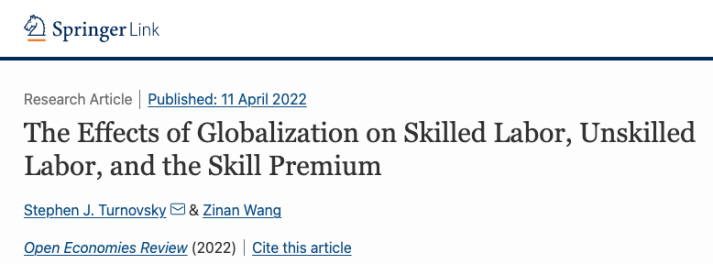时间:2022-04-18

The Effects of Globalization on Skilled Labor, Unskilled Labor, and the Skill Premium
Open Economies Review, 2022
Stephen J. Turnovsky, Zinan Wang
Abstract:
This paper numerically simulates a dynamic general equilibrium model of a small open economy, highlighting the contrasting effects of different aspects of globalization on the skill premium. Trade liberalization in the form of reductions in consumption and input tariffs are both shown to reduce the short-run skill premium. Over time the lower consumption tariff reduces it further, while the lower input tariff increases it. Financial liberalization in the form of reduced financial frictions increases the skill premium in the short run, but reduces it over time. The sensitivity and robustness of these patterns to structural characteristics are addressed in detail. Overall, the results stress the importance of taking a disaggregated and dynamic approach to evaluate the effects of globalization on the skill premium.
中文摘要:
论文通过构建小国开放经济的动态一般均衡模型分析了贸易自由化和金融自由化对工资收入分配中技能溢价的动态影响。其中,针对贸易自由化论文分别探讨了消费品关税降低与投入品关税降低两种形式的影响。对该模型的数值模拟显示两种形式的关税降低均会在短期减小技能溢价,但随着时间推移,投入品关税的降低会使得技能溢价随后逐渐增大,而消费品关税降低则会使之进一步减小。相对地,减少跨国资本流动摩擦的金融自由化在短期会增大技能溢价,但随后使之逐步降低。论文详细分析了这些结果对模型中结构性参数的敏感度与稳健性。总体上,该论文的结果强调了对全球化的形式进行细分和以动态方式分析全球化对技能溢价影响的重要性。
研究意义:
全球化对收入分配的影响是国际经济学领域非常重要且仍存有争议的议题之一。通过传统贸易模型的分析大多只关注自由贸易对经济体的不平等程度在长期稳态上的影响,而忽略了潜在的短期动态变化。本文通过对动态一般均衡模型的数值模拟分别分析了消费品关税降低与投入品关税降低两种形式的贸易自由化对工资分配中技能溢价的短期与长期影响,一定程度上弥补了文献当中的这一部分空缺。同时,文献中对全球化的另一重要形式即减少跨国资本流动摩擦的金融自由化的研究相对稀少,而本论文在一致的理论框架下还分析了金融自由化对工资分配的短期与长期的影响。论文的结果对于探讨全球化与收入不平等的关联具有一定的启示意义。
文章全文参见链接:
https://link.springer.com/article/10.1007/s11079-022-09666-6